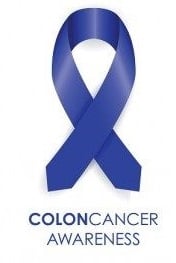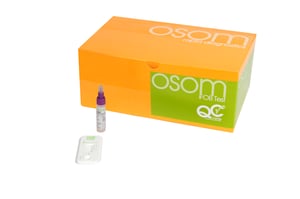March is Colorectal Cancer (CRC) Awareness Month in the US, and while that may not sound as compelling as Great American Pie Month or National Cell  Phone Courtesy Month (they’re real, look them up!), this initiative was created to drive awareness of the third leading cause of cancer-related deaths in men and in women in the US.
Phone Courtesy Month (they’re real, look them up!), this initiative was created to drive awareness of the third leading cause of cancer-related deaths in men and in women in the US.
This 31-day period is intended to educate on the importance of screening for CRC. The American Cancer Society’s estimates for the number of colorectal cancer cases in the United States for 2019 are 101,420 new cases of colon cancer and 44,180 new cases of rectal cancer. In Europe, CRC is the second most common cancer and there are approximately 500,000 new cases each year, and higher incidence rates in men than women. Colorectal cancer is a cancer that starts in the colon or the rectum. These cancers can also be named colon cancer or rectal cancer, depending on where they start, but are often grouped together because they have many features in common. Screening is especially important as CRC can be a silent disease, with an individual having little or no signs of polyps or cancer.
The Importance of Screening – Get to Know Your Options
An estimated 60% of CRC deaths can be prevented through screening, but one in three people are not up to date in CRC screening. The first step to healthier patients is awareness—patients need to know that they should be screened even if they are healthy, because if they wait until there are signs and symptoms, the cancer could be in an advanced stage.
With a colonoscopy, doctors are able to proactively remove growths in the colon and rectum before they become cancerous, but of course there’s a reason why 33% of individuals aren’t up to date on their screenings—and it’s mostly to do with the “dreaded” colonoscopy. Because of the dietary restrictions many people might be keen to avoid the prep to cleanse the colon the day before their procedure. Some may also not understand that sedation is available for the procedure.
If a patient is very skittish about the colonoscopy route, or they have no family history or symptoms, there are other screening options available. Tests are available that can detect blood in your stool, even when blood is not visible to the eye. These tests are the fecal occult blood test (iFOBT), fecal immunochemical test (FIT), or stool guaiac test. Some of these tests can even be done from the comfort of the patient’s own home, with a follow-up office visit and/or colonoscopy if necessary.
Educate, Educate, Educate
Screening should always be viewed as a key healthcare tool for prevention. Investing in screening protects us all because it may decrease the social burden of cancer; reduce all types of healthcare costs, including those for radical surgery, long-term hospitalization, and chemotherapy; and, most importantly, provide peace of mind for the patient.
There are other tools in the arsenal for providers—education is vital for all ages. However, younger adults especially should be aware of changing statistics. The American Cancer Society lowered its colorectal cancer screening recommendation to a starting age of 45 for people of average risk. The guideline was changed in part based on new data showing rates of colorectal cancer are increasing in younger populations. People born in 1990 have double the risk of colon cancer and quadruple the risk of rectal cancer compared to people born around 1950!
Beyond screening guidelines, patient should also know the signs and symptoms of colorectal cancer, which may include:
- An ongoing change in bowel habits (diarrhea, constipation, or feeling that the bowel does not empty completely)
- Stools that are narrower than usual
- Blood (either bright red or very dark) in the stool (poop)
- Rectal bleeding
- Frequent gas pains, bloating, fullness or abdominal cramps
- Weight loss for no known reason
- Feeling very tired (weakness and fatigue)
Making Things Simple
Sekisui Diagnostics is aware of the challenges in CRC screening and compliance and wants to help by providing a test with a more simplistic procedure and at a lower cost, to help patients test for CRC. The OSOM iFOB Test is a qualitative test for the immunochemical detection of fecal occult blood/human hemoglobin  (hHb) in human fecal specimens as an aid in the diagnosis of gastrointestinal disorders, including diverticulitis, colitis, polyps, and colorectal cancer.
(hHb) in human fecal specimens as an aid in the diagnosis of gastrointestinal disorders, including diverticulitis, colitis, polyps, and colorectal cancer.
Beyond the technical details, this test is fast, easy to use, and intended to improve patient compliance. Results are ready in five to ten minutes with less than one minute of hands on time. The test features an easy-to-use patient sample collection procedure, and there are no dietary or drug restrictions to which the patient must adhere.
Ultimately, clinicians need to be sure their patients are educated on all facets of this potentially deadly disease—risk factors; recommendations; signs and symptoms; screening options; and, if necessary, treatment options. When physicians take charge and develop screening programs for their patients, lives may be saved. This not only involves education but also determining the best route for screening for each patient.



Share Article